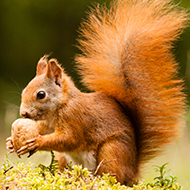
Work highlights the need for more native woodland in the UK and Ireland.
UK red squirrel conservation strategies that favour non-native conifer planting are likely to negatively impact the species, according to new research.
The study by Queen’s University Belfast and the University of St Andrew’s found that native predators in native woodland, and not conifer plantations, are key to the survival of the red squirrel in Britain and Ireland.
Conifer plantations in the UK and Ireland are typically sold as a nature-based solution for increasing the red squirrel population. However, this latest research challenges such an approach.
Working with Ulster Wildlife and citizen scientists, researchers used camera traps to survey some 700 sites across Northern Ireland over a five-year period for red squirrels, grey squirrels and pine martens.
They found that with the recovery of the pine marten, conifer plantations are likely to have a damaging impact on the survival of the red squirrel.
Once restricted to the northern reaches of the Scottish Highlands and the western counties of Ireland, the elusive pine marten has made a significant recovery in recent years. Previous research found that the pine marten benefits the red squirrel by providing natural control of the grey squirrel, which has replaced the red squirrel throughout much of Britain and Ireland.
This new research, published in Proceedings of the Royal Society B, reveals that pine martens increase red squirrel occurrence across the landscape, especially in native broadleaf woodlands. This is primarily because pine martens suppress grey squirrel populations irrespective of habitat.
The effect, however, is reversed in large non-native conifer plantations, where the pine marten reduces the occurrence of the red squirrel. Researchers believe this could be owing to the lack of alternate prey and the lack of refuges for red squirrels in highly-simplified landscapes.
More likely, however, researchers believe it is linked to the fact grey squirrels don’t cope well in these habitats. Therefore, following the pine marten recovery, red squirrels do not get the benefits of release from their rivals in the landscape as would they do elsewhere.
Dr Joshua Twining, lead author from Queen’s University Belfast, said that restoration of native predators is a ‘critical conservation tool’ but stressed its use in association with maintenance and the protection of natural habitats.
“This has global implications given the ongoing recovery of predators in certain locations such as mainland Europe,” he said. “It also shows that the current national red squirrel conservation strategies that favor non-native conifer plantations are likely to have the opposite impact to what is intended.
“Timber plantations are often promoted as being beneficial to red squirrel conservation, but our results show that they will have a detrimental effect on the species in the future,” he added.
Dr Chris Sutherland, from the University of St Andrews, added: “This research demonstrates the enormous value of large scale data collected through public participation. Combining this data with state-of-the-art analytical techniques has generated important conservation insights that until now have been overlooked.”
With more than 75 per cent of forest cover being non-native timber plantations, the UK and Ireland have some of the lowest forest cover in Europe.
“This work shows that we need to develop an alternative national conservation strategy for the red squirrel, focused on planting native woodlands alongside continued pine marten recovery,” Dr Twining concludes.



 RCVS Knowledge has welcomed Professor Peter Cockcroft as editor-in-chief for Veterinary Evidence.
RCVS Knowledge has welcomed Professor Peter Cockcroft as editor-in-chief for Veterinary Evidence.